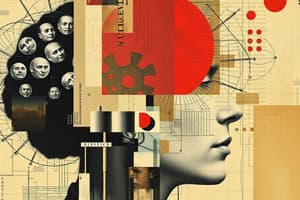Podcast
Questions and Answers
Can a machine acquire a conscious mind?
Can a machine acquire a conscious mind?
No, a machine cannot acquire a conscious mind.
Which of the following are considered parts of Artificial Intelligence? (Select all that apply)
Which of the following are considered parts of Artificial Intelligence? (Select all that apply)
- Automated Reasoning (correct)
- Playing Cards
- Natural Language Processing (correct)
- Expert Systems (correct)
The Turing Test is intended to determine if a machine can behave like a human.
The Turing Test is intended to determine if a machine can behave like a human.
True (A)
What is the power of minds to be about or represent things?
What is the power of minds to be about or represent things?
What does John Searle argue about machines passing the Turing Test?
What does John Searle argue about machines passing the Turing Test?
What are the ineffable subjective qualitative properties of experience referred to as?
What are the ineffable subjective qualitative properties of experience referred to as?
What does the Mary’s room thought experiment illustrate?
What does the Mary’s room thought experiment illustrate?
A machine can feel pain as humans do.
A machine can feel pain as humans do.
What objection to AI does Lady Lovelace present?
What objection to AI does Lady Lovelace present?
What are the two approaches to AI discussed?
What are the two approaches to AI discussed?
Flashcards are hidden until you start studying
Study Notes
Learning Objectives
- Introduction to philosophical questions surrounding Artificial Intelligence (AI).
- Exploration of whether machines can possess a conscious mind.
- Discussion of key concepts: Intentionality and Qualia.
Scope of Artificial Intelligence
- Key fields of AI include:
- Automated Reasoning
- Theorem Proving
- Game Playing
- Expert and Knowledge-Based Systems
- Natural Language Processing
- Robotics
- Machine Learning
- Evolutionary Techniques
- Neural Networks
- Genetic Algorithms
Computation and Turing Machine
- Turing Machine serves as a foundational model for computation.
- Basis for defining functions and computational capabilities.
Intelligence and the Turing Test
- Introduced in 1950 as a behavioral approach to assessing machine intelligence through "the imitation game."
- A machine passes the Turing Test if it is indistinguishable from a human.
- Alan Turing predicted machines would pass the test within 50 years; this has not yet occurred.
Challenges in AI: Intentionality
- Intentionality refers to minds representing or being about things, distinct from mere existence.
- Minds can create meanings about the world, unlike inanimate objects.
- Wittgenstein emphasized the importance of meaning to signs and symbols.
Intelligence and Intentionality
- John Searle's perspective on AI:
- Passing the Turing Test does not equate to acquiring a human-like mind.
- Machines demonstrate "Weak AI" rather than "Strong AI," lacking genuine understanding.
The Chinese Room Thought Experiment
- Conversations are possible through correct symbol manipulation, but this does not imply understanding.
- A system (person plus dictionary) may seem to understand, but individual comprehension remains absent.
Challenges in AI: Qualia
- Qualia represent the subjective, qualitative aspects of experiences.
- Example: The "redness" of red or "painfulness" of pain highlights personal experience that cannot be easily articulated.
Mary’s Room Thought Experiment
- Explores whether a person lacking sensory experience can gain new knowledge upon experiencing something firsthand.
- Supports the knowledge argument for components of understanding that require conscious experience.
Qualia and AI
- Machines can simulate pain but do not genuinely experience it, posing a challenge to the Physicalism viewpoint.
- The significant distinction remains between observable behavior and true subjective experience.
The Hard Problem of Consciousness
- Science can identify brain processes related to mental states (easy problems), but cannot comprehend how those experiences feel (hard problem).
- Example: Identifying pain via brain activities does not convey the qualitative feeling of pain.
Lady Lovelace's Objection to AI
- Asserts that machines lack autonomy and, therefore, free will.
- Questions whether machines can achieve genuine free will as independent agents.
Summary of Learnings
- Understanding the Turing Machine and Turing Test informs on AI's behavioral aspects.
- Two approaches to AI: Behaviorist (Weak AI) considers intelligence attainable, while Cognitive (Strong AI) views significant barriers.
- Intentionality, Qualia, and Free Will represent critical philosophical challenges in the quest for true AI consciousness.
Studying That Suits You
Use AI to generate personalized quizzes and flashcards to suit your learning preferences.




